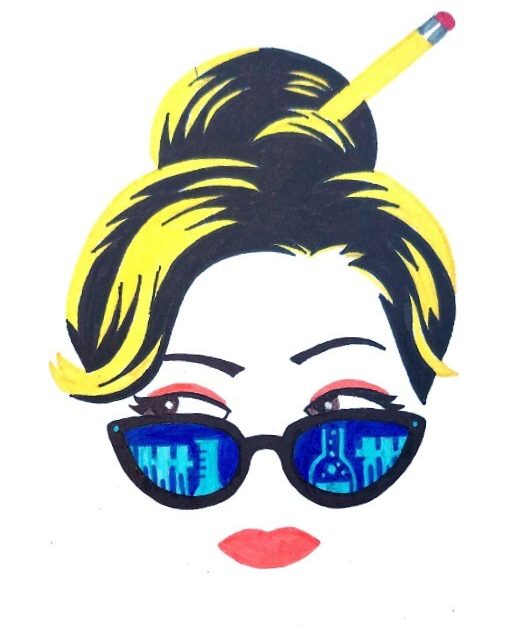In a dark television studio, women crowd the seating area, murmuring excitedly with one another as assistants frantically arrange ingredients around the pastel kitchen set. The director counts down the seconds until the show broadcasts live while the women eagerly await the host’s appearance. Finally, the red light above the stands blinks on, signaling the beginning of the recording, and the camera pans to reveal Elizabeth Zott stabbing a pencil into her blond updo and spinning around to address her supporters.
Apple TV+’s new adaptation of New York Times bestseller “Lessons in Chemistry” by Bonnie Garmus follows the life of genius female chemist Elizabeth Zott, played by Brie Larson, in the 1950s. Battling blatant sexism cemented in this era’s society, she attempts to expand her research and build credibility as a scientist. Blending witty humor with unique narration, “Lessons in Chemistry” highlights the harsh realities women faced in the scientific community.
The show commences with a glamorous scene of Elizabeth arriving at a television studio to record an episode of her cooking show, “Supper at Six.” A crowd full of women cheer loudly while waving their notebooks and pencils in the air. Elizabeth’s green pants and demure outfit contrast sharply with the floral dresses, pearl necklaces, and lacy gloves common in the crowd.
Immediately, “Lessons in Chemistry” leans into its theme of feminism and female power. Numerous male assistants approach Elizabeth as she strides confidently down the hallway, deferring to her opinion on every decision from tomatoes to baking dishes, and scrambling to prepare the set before her entrance.
Revealing her strong-willed nature, Elizabeth strays from her prepared cue cards, frustrating her superiors, but empowering housewives around the country with her genuine message and ability to make each woman feel capable and appreciated.
Following this initial clip of Elizabeth as a famous television host, the story jumps back seven years, when it becomes evident that Elizabeth’s life was not always filled with adoring fans and illustrious opportunities.
Instead, Elizabeth, a brilliant chemist, works as a lab technician at the Hastings Research Institute, where her boss, a chauvinistic and self-aggrandizing man, prevents her from conducting research, instead delegating her to brewing coffee for her coworkers.
The only person who can parallel her in intelligence is Calvin Evans, portrayed by Lewis Pullman, a world-renowned yet socially isolated chemist.
After an unpleasant first impression, the two develop an unlikely partnership based on mutual respect and admiration that blossoms into a love story that defies the accepted gender roles of the time period, emphasizing Elizabeth’s commitment to independence.
Meanwhile, the adaptation transforms Elizabeth’s nosy neighbor character, Harriet Sloane, played by Aja Naomi King, into a young Black female lawyer, building on its messages surrounding societal prejudices and inequalities.
Harriet’s storyline focuses on her passionate fight against the California Highway Commission’s plans to bulldoze through her predominantly Black neighborhood. Inspired by real historical events in which cities employed infrastructure projects to dismantle African American communities and enforce segregation, Harriet’s struggle represents challenges Black communities faced in the 1950s.
The parallels between Elizabeth, a white woman battling sexism and discrimination in the workplace, and Harriet, a lawyer struggling to overcome all of these obstacles, with an added layer of race, allow the blossoming of a heartwarming friendship. Encouraging each other to pursue their passions and supporting each other during tough times, Harriet and Elizabeth use their platforms to speak out against injustice, sparking change one small act at a time.
Although the show is set in the 1950s, even today, the STEM field is largely dominated by men. While the proportion of women in these jobs is growing, they still only make up 28 percent of this workforce.
In an especially resonating scene from the show, Elizabeth shares her groundbreaking exploration into abiogenesis, the original evolution of organic beings from inorganic molecules, hindered by the repeated snubs of the male department heads. Calvin is astounded by her ideas and asks why she is not leading her own research lab. Elizabeth matter-of-factly cites “sex discrimination,” prompting Calvin’s confusion over gender-based discrimination in intellectual pursuits. When he protests, Elizabeth challenges him, asking how many female scientists he can name. With Calvin only able to think of Marie Curie, Elizabeth exposes the systematic underappreciation and oppression faced by female scientists.
For the women of the 21st century, this corresponds to stereotypes portraying STEM jobs as “masculine,” unfair wage gaps and ingrained prejudices that women are intellectually inferior to men.
With women only representing 19 percent of computer science majors, in a 2016 study by the National Science Foundation, it is clear that the image of the lone female chemist in a room full of men is not confined to the screen.
Eventually, these prevailing societal gender norms lead Elizabeth to lose her job when she becomes pregnant, forcing her to become a television show host in order to make ends meet financially.
While the show carries through major concepts from the novel, it also introduces new levels of complexity, widening the scope from one person’s challenges, to the problems an entire community faces. As Elizabeth and Harriet struggle to find a place for themselves in an oppressive society, they inspire others to rebel against the status quo and pursue their passions.
This story was originally published on Harker Aquila on November 30, 2023.




































